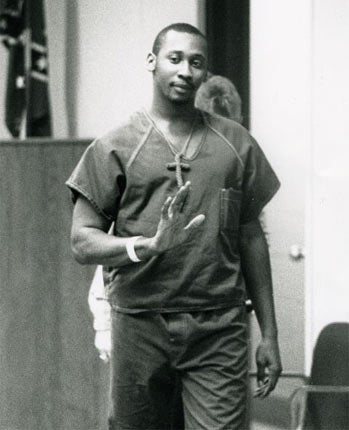For all the claims, counterclaims and fresh evidence, and despite decades of legal wrangling, one fact has always stood unchanged: in the years since Troy Davis was found guilty of murder, no jury was given a chance to reconsider the events which led to his conviction.
At 1.15am on 19 August 1989, Mark MacPhail, a 27-year-old off-duty police officer, was shot and killed after intervening in a fight outside the Burger King restaurant in Savannah, Georgia, while he was working as a security guard. Mr MacPhail died while trying to protect a homeless man. A post-mortem examination established he had been shot twice: once through the heart and once through the face, with a .38-calibre pistol. Mr MacPhail was married, with a two-year-old daughter and a younger son.
Suspicions swiftly turned to Davis, who was known to have been at the scene. He had fled Savannah the following day, and was also rumoured to have been present at a party the previous day at which a man called Michael Cooper was shot in the face, with a .38-calibre pistol similar to the one which killed Mr MacPhail.
Davis wasn't formally named, however, until police were approached by another man present at the killing of Mr MacPhail, one Sylvester Coles. In a statement, Mr Coles claimed to have seen Davis pull the trigger. Davis was arrested shortly afterwards.
Two years later, the case came to trial. It soon emerged that there was no physical evidence, or blood samples, linking the defendant to the crime. The only items recovered were some spent shell casings, which carried no fingerprints; the actual murder weapon was never found.
Instead, prosecutors relied on witness statements from nine people. Based on their testimony, the jury – seven of whom were black, and five white – unanimously found Davis guilty. They then voted for him to receive the death penalty.
In the ensuing years, serious doubts began to emerge about the key evidence. Witnesses started recanting the testimony they had given at the trial, saying that they were coerced into delivering it by police officers. Seven out of the nine of them have since said their evidence was flawed.
They include Larry Young, the homeless man. Despite being virtually illiterate, he put his name to a written statement identifying Davis. Years later, when the statement was read to him, he said it was fabricated. He "couldn't honestly remember what anyone looked like or what different people were wearing". They also include Michael Cooper, the other man allegedly shot by Davis.
"I have had a chance to review the statement which I supposedly gave to police officers on 25 June 1991," he later said, in an affidavit. "I did not read the statement before I signed. In fact, I have not seen it before today... What is written in that statement is a lie. I do not know who shot me that night. I do not know it now, and I did not know it then."
Only two remaining witnesses have not since changed their story. One has never spoken about the incident. The other is Sylvester Coles, who has been widely identified as the actual killer of Mr MacPhail. Three separate witnesses have claimed that he privately confessed to it. He is also known to have owned a .38 pistol similar to the murder weapon.
But it wasn't enough to overturn his death sentence. Although the appearance of "reasonable doubt" should prevent a "guilty" verdict, it takes more concrete evidence to overturn a conviction which has previously been passed.
The US Supreme Court ordered Georgia to reconsider the case in 2009. A year later, Davis came before Judge William Moore in Savannah. But he upheld the sentence, saying the mere appearance of doubt regarding an original trial is not sufficient to have a death sentence commuted. "While Mr Davis's new evidence casts some additional, minimal doubt on his conviction, it is largely smoke and mirrors," he argued. Millions would disagree.
Subscribe to Independent Premium to bookmark this article
Want to bookmark your favourite articles and stories to read or reference later? Start your Independent Premium subscription today.


Join our commenting forum
Join thought-provoking conversations, follow other Independent readers and see their replies